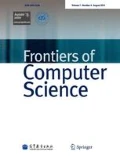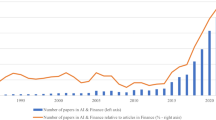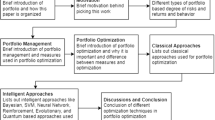Abstract
Online prediction is a process that repeatedly predicts the next element in the coming period from a sequence of given previous elements. This process has a broad range of applications in various areas, such as medical, streaming media, and finance. The greatest challenge for online prediction is that the sequence data may not have explicit features because the data is frequently updated, which means good predictions are difficult to maintain. One of the popular solutions is to make the prediction with expert advice, and the challenge is to pick the right experts with minimum cumulative loss. In this research, we use the forex trading prediction, which is a good example for online prediction, as a case study. We also propose an improved expert selection model to select a good set of forex experts by learning previously observed sequences. Our model considers not only the average mistakes made by experts, but also the average profit earned by experts, to achieve a better performance, particularly in terms of financial profit. We demonstrate the merits of our model on two real major currency pairs corpora with extensive experiments.
Similar content being viewed by others
References
Deshpande M, Karypis G. Evaluation of techniques for classifying biological sequences. In: Proceedings of Pacific-Asia Conference on Advances in Knowledge Discovery and Data Mining. 2002, 417–431
Duskin O, Feitelson D G. Distinguishing humans from robots in web search logs: preliminary results using query rates and intervals. In: Proceedings of the Workshop on Web Search Click Data. 2009, 15–19
Kadous MW, Sammut C. Classification of multivariate time series and structured data using constructive induction. Machine Learning, 2005, 58(2): 179–216
Liu X, Zhang P Z, Zeng D J. Sequence matching for suspicious activity detection in anti-money laundering. In: Proceedings of IEEE ISI International Workshops on Intelligence and Security Informatics. 2008, 50–61
Tan P N, Kumar V. Discovery of web robot sessions based on their navigational patterns. Data Mining and Knowledge Discovery, 2002, 6(1): 9–35
Wang J G, Huang J Z, Guo J F, Lan Y Y. Recommending high-utility search engine queries via a query-recommending model. Neurocomputing, 2015, 167(1): 195–208
Huang X, Cheng H, Li R H, Qin L, Yu J X. Top-k structural diversity search in large networks. Proceedings of the VLDB Endowment, 2013, 6(13): 1618–1629
Hutter M. On the foundations of universal sequence prediction. In: Proceedings of International Conference on Theory and Applications of Models of Computation. 2006, 408–420
Kaj L N. Application of a simple likelihood ratio approximant to protein sequence classification. Bioinformatics, 2006, 22(23): 2865–2869
Wang J L, Zhao P L, Hoi S C H. Cost-sensitive online classification. IEEE Transactions on Knowledge and Data Engineering, 2014, 26(10): 2425–2438
Zhu Z X, Xiao J, Li J Q, Wang F X, Zhang Q F. Global path planning of wheeled robots using multi-objective memetic algorithms. Integrated Computer-Aided Engineering, 2015, 22(4): 387–404
Mao R, Xu H L, Wu W B, Li J Q, Li Y, Lu M H. Overcoming the challenge of variety: big data abstraction, the next evolution of data management for aal communication systems. IEEE Communications Magazine, 2015, 53(1): 42–47
Wang J L, Zhao P L, Hoi S C H, Jin R. Online feature selection and its applications. IEEE Transactions on Knowledge and Data Engineering, 2006, 26(3): 698–710
Mao R, Zhang P H, Li X L, Liu X, Lu M H. Pivot selection for metricspace indexing. International Journal of Machine Learning and Cybernetics, 2016, 7(2): 311–323
Lu M H, Tang Y N, Sun R C, Wang T F, Chen S P, Mao R. A real time displacement estimation algorithm for ultrasound elastography. Computers in Industry, 2015, 69(1): 61–71
Li J Q, Liu C C, Liu B, Mao R, Wang Y C, Chen S, Yang J J, Pan H, Wang Q. Diversity-aware retrieval of medical records. Computers in Industry, 2015, 69(1): 81–91
Zheng K, Zhou X F, Fung P C, Xie K X. Spatial query processing for fuzzy objects. The VLDB Journal, 2012, 21(5): 1–23
Littlestone N, Warmuth M K. The weighted majority algorithm. In: Proceedings of Symposium on Foundations of Computer Science. 1989, 256–261
Littlestone N. Learning quickly when irrelevant attributes abound: a new linear-threshold algorithm. In: Proceedings of Symposium on Foundations of Computer Science. 1987, 68–77
Rosenblatt F. The perceptron: a probabilistic model for information storage and organization in the brain. Psychological Review, 1958, 65(6): 386
Valiant L G. A theory of the learnable. Communications of the ACM, 1984, 27(11): 1134–1142
Blum A. Separating distribution-free and mistake-bound learning models over the boolean domain. In: Proceedings of Symposium on Foundations of Computer Science. 1990, 211–218
Widrow B, Hoff M E. Adaptive Switching Circuits. Cambridge: MIT Press, 1988
Wei L, Keogh E. Semi-supervised time series classification. In: Proceedings of the 12th ACM SIGKDD International Conference on Knowledge Discovery and Data Mining. 2006, 748–753
Xi X P, Keogh E, Shelton C, Wei L, Ratanamahatana C A. Fast time series classification using numerosity reduction. In: Proceedings of the 23rd International Conference on Machine learning. 2006, 1033–1040
Lewis D D. Naive (bayes) at forty: the independence assumption in information retrieval. In: Proceedings of European Conference on Machine Learning. 1998, 4–15
Yakhnenko O, Silvescu A, Honavar V. Discriminatively trained markov model for sequence classification. In: Proceedings of IEEE International Conference on Data Mining. 2005, 498–505
Eban E, Birnbaum A, Shalev-Shwartz S, Globerson A. Learning the experts for online sequence prediction. In: Proceedings of the International Conference on Machine learning. 2012, 125–133
Cesa-Bianchi N, Freund Y, Haussler D, Helmbold D P, Schapire R E, Warmuth M K. How to use expert advice. Journal of the ACM, 1997, 44(3): 427–485
Foster D P, Vohra R V. A randomization rule for selecting forecasts. Operations Research, 1993, 41(4): 704–709
Abernethy J, Bartlett P, Rakhlin A. Multitask learning with expert advice. In: Proceedings of International Conference on Computational Learning Theory. 2007, 484–498
Avidan S. Ensemble tracking. IEEE Transactions on Pattern Analysis and Machine Intelligence, 2007, 29(2): 261–271
Yu C N J, Joachims T. Learning structural svms with latent variables. In: Proceedings of the 26th Annual International Conference on Machine Learning. 2009, 1169–1176
Ron D, Singer Y, Tishby N. The power of amnesia: learning probabilistic automata with variable memory length. Machine Learning, 1996, 25(2): 117–149
Zhao P, Hoi S, Zhuang J. Active learning with expert advice. In: Proceedings of the 29th Conference on Uncertainty in Artificial Intelligence. 2013, 704–713
Zhu J, Yang J, Xiao J, Huang C Q, Zhao G S, Tang Y. Online prediction for forex with an optimized experts selection model. In: Proceedings of Asia-Pacific Web Conference. 2016, 371–382
Zheng K, Huang Z, Zhou O Y Zhou X F. Discovering the most influential sites over uncertain data: a rank based approach. IEEE Transactions on Knowledge and Data Engineering, 2012, 24(12): 2156–2169
Zheng K, Su H, Zheng B L, Shang S, Xu J, Liu J, Zhou X F. Interactive top-k spatial keyword queries. In: Proceedings of the 31st IEEE International Conference on Data Engineering. 2015, 423–434
Vapnik V N. The nature of statistical learning theory. IEEE Transactions on Neural Networks, 1995, 8(6): 1564–1564
Acknowledgements
This work was supported by the Natural Science Foundation of Guangdong Province, China (2015A030310509), the National Natural Science Foundation of China (Grant Nos. 61370229, 61272067, 61303049), the S&T Planning Key Projects of Guangdong Province (2014B010117007, 2015B010109003, 2015A030401087, 2016A030303055, 2016B030305004, and 2016B010109008) and the S&T Projects of Guangzhou Municipality, China (201604010003).
Author information
Authors and Affiliations
Corresponding author
Additional information
Jia Zhu is currently an associate professor in the School of Computer Science, South China Normal University, China. He finished his postdoctoral fellowship at United Nations University, Macau, China. Prior to that, he received his PhD degree from The University of Queensland, Australia in 2013 and his BS and MS degrees from Bond University, Australia in 2004 and 2006, respectively. His research interests include machine learning and information retrieval. He has published several papers on top conferences and journals, such as Information Sciences and WWW.
Xingcheng Wu is currently a postgraduate student of the School of Computer Science, South China Normal University, China, supervised by Dr. Jia Zhu. His research interests include data mining, machine learning, and cloud computing.
Jing Xiao is a professor in the School of Computer Science at South China Normal University, China. She received her PhD degree from the School of Computing, National University of Singapore, Singapore in 2005. She is currently the vice-chair of the ACM and IEEE Guangzhou sections and a senior member of China Computer Federation (CCF). Her research interests include data mining, recommendation systems, and evolutionary computation algorithms.
Changqin Huang is a professor in the School of Information Technology in Education, South China Normal University, China. He is currently a Guangdong specially appointed professor (Pearl River Scholar) and a senior member (E200014100S) of China Computer Federation (CCF). He received his PhD degree in computer science and technology from Zhejiang University, China in 2005. He has published more than 80 research papers in international journals and conferences. His research interests include service computing, cloud computing, semantic web, and education informationization.
Yong Tang is a professor and the dean of the School of Computer Science at South China Normal University, China. He also serves as the director of the Services Computing Engineering Research Center of Guangdong Province. He has published more than 200 papers and books. He is also a distinguished member and the vice director of the Technical Committee on Collaborative Computing of China Computer Federation (CCF). Moreover, he served as the general or program committee co-chair of more than ten international and national conferences. His current research interests include knowledge and data engineering, temporal database, cooperative computing, social network services, and big data applications.
Ke Deng is currently a lecturer in RMIT University, Australia. He was awarded a PhD degree in computer science at The University of Queensland, Australia in 2007 with focus on data and knowledge engineering. He was a researcher in Huawei Noah Ark’s Research Lab, Hong Kong, China from 2013 to 2015. He was also a postdoctoral research fellow at CSIRO ICT Center in 2007 and an ARC Australian Postdoctoral Fellow from 2010 to 2012.
Electronic supplementary material
Rights and permissions
About this article
Cite this article
Zhu, J., Wu, X., Xiao, J. et al. Improved expert selection model for forex trading. Front. Comput. Sci. 12, 518–527 (2018). https://doi.org/10.1007/s11704-017-6472-3
Received:
Accepted:
Published:
Issue Date:
DOI: https://doi.org/10.1007/s11704-017-6472-3




